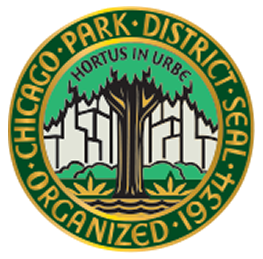1425 N. Damen Avenue
Chicago, IL 60622
Hours
Park Hours
Description
Located in the West Town community area, Wicker Park totals 4.74 acres and features a fieldhouse with gymnasium and meeting rooms. Outside the park offers a large children’s playground with an interactive water spray feature, ornamental community gardens, a historic fountain, a dog friendly area, a baseball field, basketball courts and an athletic field for soccer or football.
Many of these spaces are available for rental. Park-goers come to Wicker Park for seasonal sports and early childhood programs at the facility. After-school programs are offered throughout the school year, and in the summer youth attend the Park District’s popular six-week day camp.
Though small in size, Wicker Park is especially well known for its lush and well-tended gardens. These ornamental gardens, which comprise 10,000 square feet of space, were designed, funded, and are maintained by volunteers affiliated with the Wicker Park Garden Club. The club works in close collaboration with the Chicago Park District through the Community Gardens in the Parks program. Various sections of the gardens are designated in memory of individuals who worked to develop the gardens in the park: William Westfall, Marion Smith, Casey Wismont, Conrad Cwiertnia, and Allen Blaurock. All interested gardeners are invited to attend weekly garden tending days where they will learn how to design and maintain gardens for their homes.
In addition to programs, Wicker Park hosts fun special events throughout the year for the whole family, including Movies in the Park screenings, live music concerts during the seasonal farmers market, plant sales and other Night Out in the Parks events.
History
In 1870, when businessmen and developers Charles G. and Joel H. Wicker began constructing drainage ditches and laying out streets in their subdivision, they donated a four-acre parcel of land to the City to be used as a public park.
Fencing the triangular site to keep cows out, the City created an artificial lake in the center of the park, surrounding it with lawn and trees. As the Wickers had hoped, the area developed into a fashionable middle- and upper-class neighborhood.
Pursuant to an ordinance in 1885, the City transferred control and maintenance of Wicker Park to the West Park Commission. Five years later, the West Park Commission filled the park's lake, replacing it with lawn. Between 1892 and 1895, a fanciful fountain was installed in the park. The cut-granite fountain had an outer basin which still exists, lovely ornamentation, and floral urns. In the center was a cast-iron fountain with foliage motifs and small gargoyle faces from which water was sprayed.
In 1908, Jens Jensen, then West Park System Superintendent, removed the cast-iron fountain and replaced it with a jet spray, converting the fountain into a children's wading pool. Jensen also built pergolas (trellis-like structures) and planted additional trees and shrubs in Wicker Park.
In 1934, the park became part of the Chicago Park District’s portfolio when the West Park Commission and 21 other commissions were consolidated into the Chicago Park District. In 1957, the City of Chicago transferred ownership of the property to the Chicago Park District pursuant to the Chicago Park and City Exchange of Functions Act. To provide additional programs, the Park District soon constructed a small fieldhouse in Wicker Park. The building proved inadequate, and the Park District replaced it with an attractive post-modern fieldhouse in 1985.
Throughout its history, the park has borne the Wicker family name. Having settled in Chicago in 1839, Charles G. and his brother Joel H. opened a wholesale grocery business. Charles went on to own two railroad lines, and to serve as Alderman, Cook County Supervisor, and Illinois State Legislator.
Advisory Council
2nd Tuesday of the month at 6:30pm


































